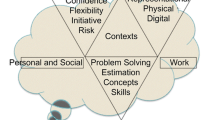Abstract
There was a time when, in the Liberal Arts, philosophy and education enjoyed the most intimate and productive relationship. Drawing together philosophy and nature they sought to understand the greatest of human mysteries. This meant thinking about both the macrocosm and the microcosm and especially the relation between them. In this relation lies the most fundamental vocation of Liberal Arts education—Know Thyself. In my article I attempt to retrieve the philosophical education that lies between the individual and the universe. I explore the macrocosm through Newton and Einstein, the microcosm through Heisenberg and Zizek, and the relation between them in the structure of the modern Kant/Hegel philosophical experience. The result—only relatively overambitious—is an educational theory of the uncertainty of the universe and everything in it.
Similar content being viewed by others
Notes
In the first few pages of this article and then at times beyond that, I am employing the unusual strategy of responding to some of my anonymous reviewers’ comments. I want to acknowledge the high quality of their responses, and to thank them very much for the ways in which they engaged with this speculative piece and responded to its spirit of enquiry as well as its inherent weaknesses. I thank, too, Gert Biesta, for his support and trust.
I will return to this issue below in relation to Zizek’s notion of absolute particularity.
Clearly this analysis of relation cannot be carried out without definitions of the content of the pairs of categories, but within the argument I am about to present all content is in any case always actual, which means that all definitions are always already mediated in and through social and political experience. If anything the reverse is the case to that noted by my reviewer, that is, it is most often actual definitions that are traduced into merely abstract content.
Not, however, Ross Abbinnett (2010) who reviewed Education in Hegel in this Journal.
I have added this short section to go some way to meeting the reviewers’ requests for more on the idea of ‘education in Hegel’. A fuller account of this idea of modern metaphysics can be found in Tubbs (2009) chap. 6.
I mean here the idea in the Posterior Analytics that what an object is ‘is its explanation, and that it is not possible for it to be otherwise’ (I.2.71b, 11; Aristotle 1984, 115).
Aristarchus of Samos (c. 310-250 B.C.) had also argued for such a heliocentric theory.
A reviewer noted that philosophers who draw philosophical conclusions from quantum theory often act as if they understand it when professional physicists themselves understand the maths but are not at all clear that quantum theory can be understood on an existential basis. I don’t think this is the case for Heisenberg. Moreover, this should not discourage philosophers from exploring and struggling with the existential meaning of quantum theory.
Heisenberg explains that the term ‘complementarity’ comes from Niels Bohr. It describes how two pictures of the world, for example, those of waves and particles, can be mutually exclusive yet complement each other. Heisenberg says here, ‘By playing with both pictures, by going from the one picture to the other, and back again, we finally get the right impression of the strange kind of reality behind our atomic experiments’ (Heisenberg 2000, 18).
Even more intriguing, in the idea of vacuum fluctuation particles pop into being and then annihilate themselves before reaching full actuality. Somehow, in the gap between event and inscription, the particle chooses which law to obey. Perhaps our universe is the same, and will choose to annihilate itself. Perhaps, says Zizek, the universe in its entirety ‘does not exist [and] is a mere quantum fluctuation without any external boundary that would enable us to conceive of it as “actual”’ (1996, 228).
.
I deal at length with the nature of such NeoPlatonic presuppositions in Tubbs (2009).
Kant says ‘thoughts without content are empty [and] intuitions without concepts are blind’ (1968, A51/B75).
On the caution of employing the term ‘third’ here see below.
References
Abbinnett, R. (2010) ‘Review of Education in Hegel’ in Studies in Philosophy and Education, Volume 29, No. 1 January.
Adorno, T. W. (1991). ‘Why Philosophy?’. In David Ingram & Julia Simon-Ingram (Eds.), Critical theory, the essential readings (eds ed.). New York: Paragon House.
Aristotle, (1984) The Complete Works of Aristotle volume 1, ed. J. Barnes, Oxford: Oxford University Press.
Hawking, S. (2005). A briefer history of time. London: Bantam Books.
Hegel, G. W. F. (1969). Science of logic. London: George Allen & Unwin.
Hegel, G. W. F. (1977). Phenomenology of spirit. Oxford: Oxford University Press.
Heisenberg, W. (1974). Across the frontiers. New York: Harper and Row.
Heisenberg, W. (2000). Physics and philosophy. London: Penguin.
Kant, I. (1968). Critique of pure reason. London: Macmillan.
Newton, I. (2002). Principia. Philadelphia: Running Press.
Sokal, A. (1996) ‘Transgressing the boundaries: Towards a transformative hermeneutics of quantum gravity,’ Social Text, Spring/Summer pp. 217–252; reprinted with annotations in Sokal (2008) Beyond the Hoax, Oxford: Oxford University Press.
Tubbs, N. (2008). Education in Hegel. London: Continuum.
Tubbs, N. (2009). History of western philosophy. Basingstoke: Palgrave.
Wilbur, K. (2001). Quantum questions. Boston: Shambhala.
Zizek, S. (1996). The indivisible remainder. London: Verso.
Zizek, S. (1999). The ticklish subject. London: Verso.
Author information
Authors and Affiliations
Corresponding author
Rights and permissions
About this article
Cite this article
Tubbs, N. Know Thyself: Macrocosm and Microcosm. Stud Philos Educ 30, 53–66 (2011). https://doi.org/10.1007/s11217-010-9209-4
Published:
Issue Date:
DOI: https://doi.org/10.1007/s11217-010-9209-4




